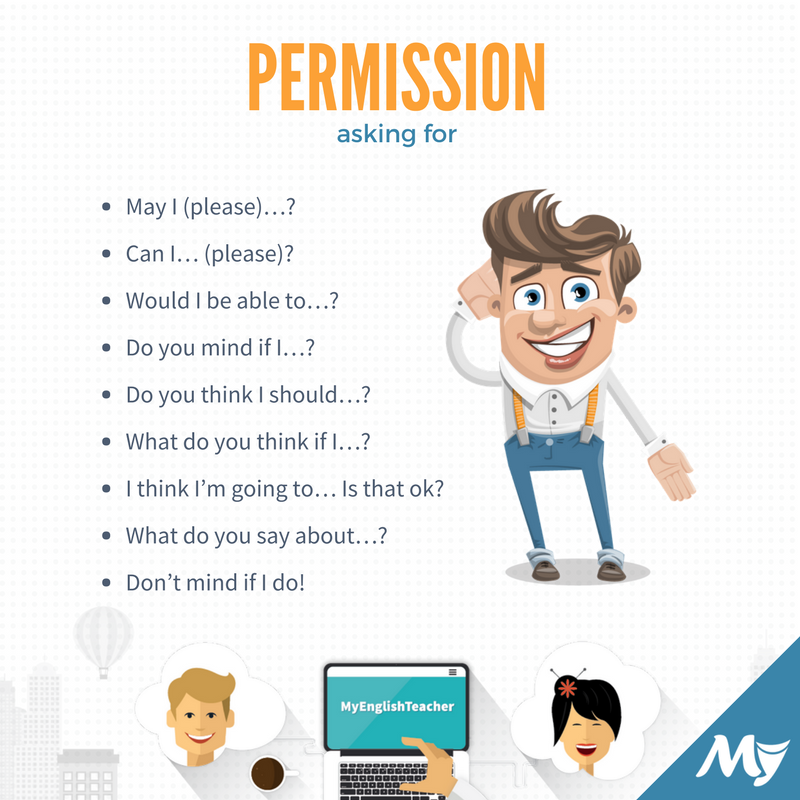
If you come up with an idea and hope to do it, you usually have to ask permission for it! Whether it is with your family or at school or work, you will often have to ask to get what you want because other people cannot guess what you desire.
In these cases, how can you ask for permission? Below are several ways – and the situations in which to use them – that you can ask to do something.
1. You have an idea of what you want to do and want to be polite
All three phrases have the same meaning, but each of them has a slightly different effect when it comes to how polite you are being.
May I (please)…?
This is usually very polite, and used when you are asking someone who has authority over you for something. To make it even more polite, add the please after asking it.
Examples
- May I please use the restroom?
- May I go to the park with my friends today please?
- May I look over this contract and discuss it with my family members before signing it and getting it back to you?
Can I… (please)?
Asking can you do something is more direct than using may or could. In the case of a very formal situation, it may be better to stick with the other ways of asking the question, but it is acceptable in many situations. If you want to be politer, it is best to add please into the sentence, especially when you are talking to someone who has authority over you.
Examples
- Can I use your pen please?
- Can I spend my weekend in Portland before traveling to Seattle?
- Can I please see the detailed plans for your kitchen remodeling?
Could I… (please)?
Asking something with could is a gentler way to ask than can I. It is used the same way as can.
Examples
- Could I borrow some money to pay for dance class and pay you back next week?
- Could I please watch the next episode of this show before we start cleaning the house?
- Could I get another glass of water please?
2. You know something that you could do and you really value the other person’s opinion
For these phrases, you are suggesting something that you want to do, or something that you could do, and trying to see whether the person you ask is approving of your suggestion or not. Asking for permission in these ways shows that you value the other person’s opinion.
Even though you already have an idea of what to do, you still want them to weigh in – to provide their opinion – on which you will base your decision. These are great phrases to use if speaking to a teacher at school or a boss at work. They show that you are not asking them to come up with the ideas for you, just to help guide your ideas in a way that works for everyone.
Would I be able to…?
Asking if you are able to do something allows the person you ask to answer either yes or no. This question respects their time and expertise, and you do not have to take up more time than they are willing to give. This is a great way to ask for permission if you are short on time or have caught the person at a busy time.
Asking this way is a great lead up question to adding in a reason why you think a certain way, which can help the person you ask better understand why you suggest what you suggest. It also allows them to give you an alternative and explain why they think another way, instead.
Examples
- Would I be able to switch the color palates for the two projects? I think they fit together better that way.
- Would I be able to turn this essay in on Monday next week? I will be out of town on Tuesday, when the paper is due.
- Would I be able to ask you to give me a hand with lifting this cabinet? It is a little heavy.
Do you mind if I…?
While the previous question asks for the opinion of the person, this question asks whether they will be bothered in you do something. The purpose of asking for permission this way is to show that you do not want to become a burden for this person. You can ask if someone minds that you do something at school or at work, and this question is also commonly used when asking a stranger if you can play your music out loud, take an empty seat at their table, etc.
When you ask if someone minds that you do something, you show a little more determination to do it. you are not asking for their permission the way Would I be able to does; instead, you generally have made up your mind and just want to make sure you will not bother the other person.
Examples
- Do you mind if I sit here with you?
- Do you mind if I have a snack? I haven’t eaten all morning.
- Do you mind if I rearrange your books for you? They seem a little bit messy.
Do you think I should…?
With this question, you show a little more reliance on the opinion of the person that you are asking. When you ask if you should do something, it shows that you have a tentative idea of it, but you are really not sure and will probably take their suggestion.
Whether or not you should ask for permission this way depends on the situation and your relationship with the person that you are asking. If you are in a business setting with your boss, it is often better to avoid this way of asking for permission because it shows that you are too timid. However, it is a good way to ask for advice from a friend.
Examples
- Do you think I should go to this party with him or not?
- Do you think I should just let this go because we will have to work together again next time?
- Do you think I should buy the purple shirt or the blue hat?
What do you think if I…?
With this question, you are again being a little more assertive. However, this assertiveness is mixed with a genuine desire to know what the other person thinks about it. If you come across a problem when you are working, this is a great way to discuss it with your boss.
Instead of trying to come up with a perfect idea and just having them sign off on the solution, you are instead asking them to have a conversation with you so you can pick their brain – or really ask them questions to help you understand their thinking – and see what could work and what could not.
Even though this comes across as a yes or no question, it will usually lead to your boss telling you a lot more about the way that they think. This question is a good mix between showing that you have expertise and you have thought about a solution to the problem, but also making sure you hear what they have to say about it.
Examples
- What do you think if I ask the marketing department to redesign this ad and target a different audience than before?
- What do you think if I switch the agendas for the morning and the afternoon, so that people will be more awake when they hear about the more important information?
- What do you think if I spend more time working on the train project and give my responsibilities on the bus project to someone else?
3. You really want to do something, you don’t know what they will say, and you need or really want them to say yes
This category of ways to ask for permission are more assertive than the ones before. Instead of relying too much on what the other person might think of you, you are instead pushing them a little to go along with what you say. Most people will agree with you if you ask for permission using these sentences because they show that you are committed to the ideas already.
Unless they have a specific and strong reason to say no, you will likely get your way. However, this does not mean that people will be happy about agreeing, or that people will respect your authority. These questions are best used when you are the boss, or you are the one who should be making all the decisions.
I think I’m going to… Is that okay?
Saying that you think you are going to do something is a little gentler, and asking whether that would be okay is a great way to check what the other person will think of what you do. However, if you want to be more aggressive, you do not have to ask whether it is okay that you do something.
Examples
- I think I’m going to take my car to the shop tomorrow morning and then ride the bus to work. Is that okay?
- I think I’m going to take two weeks for vacation starting next Monday. Is that okay?
- I think I’m going to buy this piece of art for our living room. Is that okay?
I believe I will… Okay?
Believing that you will do something is a little bit more assertive and sure than thinking that you will do something. Asking for permission this way shows that you pretty sure about what you want to do, and in some circumstances, may not actually care what the other person thinks.
Sometimes, because of how sure you may sound about your decision, this question may come off as a little bit rude. To avoid this, make sure the okay that you ask at the end of the question doesn’t sound like it was added on just so you don’t sound rude.
Examples
- I believe I will try to finish the project before I go to sleep. Okay?
- I believe I will have more time to pick up the dry cleaning and stop by the grocery store tomorrow after work. Okay?
- I believe I will be better off traveling to Japan and staying longer than trying to add in a trip to China or South Korea as well. Okay?
I will… Is that alright? (Or, is it alright to…)
Similar to the above, asking for permission in this way shows that you have already made up your mind. If you add Is that alright? At the end, it shows that you are a little bit more sensitive.
Examples
- I will buy the cotton candy you want from the online store. Is that alright?
- I will take out the trash tomorrow, so put the things that you don’t need in there before then. Is that alright?
- I will be in New York City the second week of July. Is it alright to stay at your house during that time?
What would you say if I…?
Out of all the ways to ask permission in this blog post, this is the one that is the most assertive. While this question does not outright say that you will do what you are thinking of doing regardless of what the other person says, it does show that you have already strongly made up your mind in favor of whatever it is that you want to do.
You likely will not change your mind, even if the other person has something important and useful to say. Instead of asking permission, sometimes this question is used to warm someone up to the idea of something that you have already done. If someone asks you this, you can be suspicious about whatever idea they ask you about.
Examples
- What would you say if I sell my car and commit to using only rideshare apps when I need to get around?
- What would you say if I dropped out of college to try out this idea that I have?
- What would you say if I told you all that we would not be giving out Christmas bonuses this year because our company needs the money to invest somewhere else?
4. You already know they will say yes
Don’t mind if I do!
Usually, you will say this sentence after someone has already offered something to you, or said that you could do it. They have already welcomed what it is that you want to do, so you can respond Don’t mind if I do! To show them that you would like to take them up on that offer.
Examples
- Taylor: I’m full already, so would you like to have the rest of my fries?
- Bob: Don’t mind if I do!
- Harry: I bought these baseball tickets because I thought that I would have to time to go tomorrow night, but I just had an emergency meeting come up during that time. Would you like them instead?
- Liam: Don’t mind if I do!
5. You are throwing out ideas
If you are beginning to collect different ideas, brainstorming, and just wanting to see if the person you are talking to likes any of them, you can use some of these sentences. They don’t put any pressure on either of you to like or dislike the ideas, and asking in such an open-ended way means that you can get great feedback on the ideas.
Should I…?
Examples
- Should I go to the store and look at more color plates for the wall paint tomorrow? I can’t decide on a color.
- Should I focus on getting to all the museums or just eating the best food in the city?
- Should I pack for winter weather or summer weather?
How about I…?
Examples
- How about I drop you off first so you can stand in line?
- How about I rearrange the designs and you can look at them again tomorrow?
- How about I do this again another time?
What about…?
Examples
- We have been focusing all our attention on the marketing of the product. What about changing our focus to something else?
- What about watching an episode of a TV show instead of watching a movie?
- What about using digital magazines, books, and newspapers instead of print ones?
What do you say about…?
Examples
- What do you say about hiring Kelsey as our babysitter?
- What do you say about using the extra profits from this year to invest in more marketing?
- What do you say about shifting our target audience from all children to just girls?
More for you:
Using Will or Would in a Sentence!
CAN or MAY? The difference between CAN and MAY!
Allow vs Permit vs Let vs Enable
Best questions to ask to get to know someone!
Phrasal Verbs with ASK in Image!
Cute Ways to Ask a Girl Out

























Great tutorial …. excellent mechanisms of asking with associated environment and examples.
Thank you!
Hello
hi